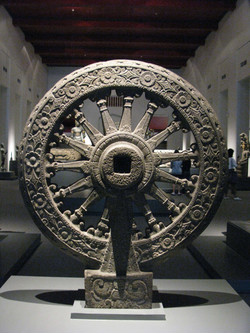Artwork Search
Arts in Southeast Asia Database
Dharmachakra
Keywords :
| Site common name | Bangkok National Museum |
|---|---|
| Type of artwork | Sculpture |
| Sub district | Phra Borom Maha Ratchawang |
| District | Khet Phra Nakhon |
| Province | Bangkok |
| Region | Central |
| Country | Thailand |
| Geographic Coordinates DMS | Lat : 13.7576 Long : 100.492222 |
| Geographic Coordinates UTM | Zone : 47 P Hemisphere : N E : 661329.97 N : 1521418.09 |
| Place of artwork | In the Dvaravati room |
| History of production | The exact age of this art object is unknown, but its artistic features date it back to the Dvaravati period. |
|---|---|
| Production process | Stone carving |
| Conservation | Found at Sa-ne Temple in Mueang District, Nakhon Pathom Province, the Dharmachakra was donated to the Museum by Prince Bhanubandhu Yugala. The Ministry of Education announced the Dharmachakra is an antique under duplication control in accordance with the announcement of the Ministry of Education regarding antiques or objects of art under duplication control dated the 24th June 1998 published in the Royal Thai Government Gazette, General Announcement no. 115, Section 65 Ngor, dated the 13th August 1998. |
| Size | Height 106 cm. (its tenon joint excluded); 88 cm. in diameter |
| Art | The Dharmacakra consists of 3 significant parts, that is, a hub in the middle, spokes the spaces between which were cut through and make it look thin, and the outer part of the Wheel which is a felloe was carved with round flower and lozenge patterns. The rim of the felloe was engraved with a decorative flame motif. The triangular lower part of the Wheel serves to bear its load and connects to a square base. Many parts of the Wheel bear Pali inscriptions using Pallava script which describe the Buddhist Doctrine, namely excerpts from Dhammacakkapavattana Sutta. |
| Key academic information | Dharmacakras are unique sacred objects of the Dvaravati culture which denote the Buddhist Doctrine, and mark the establishment of Buddhism within the areas. This Dharmacakra is even more important, as it bears Pali inscriptions using Pallava script which are excerpts from Dhammacakkapavattana Sutta or the teachings concerning turning the Wheel of Law. This represents the time when Buddha delivered the First Sermon and turned the Wheel of Law, and this Dharmacakra also signifies that the people of Dvaravati fondly understood the meaning of Dharmacakras. |
| Notice | This Dharmacakra carries Pali inscription using Pallava script which describes an excerpt from Dhammacakkapavattana Sutta which is a Sutta regarding the First Sermon. It was found in situ together with figures of crouching deer which symbolize Isipatana Mrigadava or the Deer Park where Buddha first taught the Dharma. This reveals that Buddhists during the Dvaravati period fully comprehended the concept of Dharmachakra images, namely Buddha turned the Wheel or started spreading his teachings since the First Sermon. |
| Period | Historical Period |
| Art period | Dvaravati |
| Age | 12th-16th Buddhist century |
| Religion | Buddhism |
| Sect | Theravada |
| Religion and belief | Theravada |
| Type of License | Attribution-NonCommercial-NoDerivs (CC BY-NC-ND) |
|---|---|
| Rights | Princess Maha Chakri Sirindhorn Anthropology Centre |
| Date of record creation | 2016-08-19 |
| Record creator | Rungroj Thamrungraeng |


